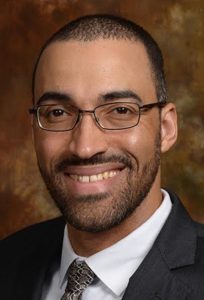Martin Luther King Jr. famously remarked that 11 a.m. on Sunday was the “most segregated hour in America,” This has been an enduring truth, and the reasons for it are both noble and ignoble.
Sunday morning became the most segregated hour in America because by the late 18th and early 19th centuries, free Black people in particular had become weary of being second-class citizens in the white church, relegated to the balconies and refused access to the altar for prayer. Furthermore, the brush harbor roots of the Black church in slavery meant that segregation was necessary if the church was to provide a refuge for our people in struggle.

Paul Robeson Ford
The rising tide of consciousness about the way that race and racism/white supremacy literally defined the creative forces that produced so many of our institutions means that there is an opportunity to imagine what the future is that we are fighting for and what makes it worthy of the war.
Much of the discussion of the rebirth of the church in this post-pandemic reality has focused on how to live into a new, hybrid “onsite/online” dynamic where the church will have to operate on both fronts simultaneously. As many have pointed out, this is both a logistical challenge and one that forces us to reorient how we approach ministry. But there is a deeper issue, one that both coincides with the timing of this post-pandemic season we are entering and, yet, stands alone in determining the future of the church whether onsite or online.
What will the church’s mission be for the years to come?
What world will it envision and what future will it be fighting for?
One central image that must anchor this vision for the future is an end to the most segregated hour in America. To be sure, this concern is not new, and clergymen and women all over the nation have been trying to create multi-racial worship spaces for at least 30 years now. As early as the 1940s, Howard Thurman planted an intentionally multi-racial church in California. Despite the best of intentions, these efforts were all ill-fated because the world that surrounded them was still so defined by white supremacy, unapologetic racism and genteel prejudice. Even my own beloved home congregation — The Riverside Church — has been largely unable to successfully manifest the multi-racial ideals to which it has aspired all my life.
But this is a new season, and I firmly believe God is doing a “new thing,” regardless of whether or not we all perceive it yet. While Black people were trained by white supremacy to follow white leadership in the community, in the professional world and in the church, it is only now — in this moment — that we are seeing masses of white people who are willing to train themselves to follow Black leadership; they are doing this because of a larger and deeper commitment to radically change their ways of being in this world in order to uproot the patterns and practices that have embedded racialized injustice into the fiber of our social being. They are doing this because they realize that it is — exclusively — the voices of those who have been placed on the underside of history that will be able to redeem this nation.
For white people of faith, this is manifesting itself as a conscious choice to come into the Black church to serve and submit themselves to Black leadership. White people, coming into Black churches, to follow Black pastors and church leaders. This is a new thing, indeed.
“White people, coming into Black churches, to follow Black pastors and church leaders. This is a new thing, indeed.”
The skeptics are plentiful; it always has been the case historically that if white people enter Black-owned and Black-led institutions, they are entering the only way that white people know how: with conquest on their minds (consciously, or even subconsciously). They are entering in order to take over and take charge and tell Black folk how to do whatever that institution does.
When I talked with an elder colleague of mine about the new movement of white people into Black churches under this new set of circumstances, he reminded me how he used to cuss every time white people joined his church because of the historical reality of their intentions. But if I am discerning this moment rightly, we will not have reason to cuss but, instead, to celebrate.
If I am right, then our efforts to end the most segregated hour in America — in this moment, in this time — might actually be part of a future worth fighting for, instead of a Trojan Horse.
If I am right, then ending the most segregated hour in America will be part of ending the story of America as we have known it.
If I am right, then our white brothers and sisters who come into the places that we have built to flee from them and protect ourselves from them, will come with repentant hearts and spirits that are resolute and ready to separate the wheat from the chaff.
If I am right, then there is a vision that God is unleashing, and the church of this moment must follow the directions of the biblical prophet Habakkuk and write this vision down and make it plain.
“If I am right, then our efforts to end the most segregated hour in America … might actually be part of a future worth fighting for, instead of a Trojan Horse.”
If I am right, then the mission for the post-pandemic church is not just to accommodate an onsite/online means and mode of being, but to use those means and modes to build a more just and equitable world.
If I am right, then the past preoccupations with standards of private holiness (such as bedroom politics and purity) will simply have to be tossed in the dumpster fire that is and has been the institutional church for decades now.
If I am right, then our primary concern with judging the world — instead of loving God’s people — will have to suffer an extinction-level event like the one that took out the dinosaurs.
If I am right, then our lingering investment in the traditions of Christendom will require immediate and total disinvestment so that we can reallocate our resources to the tomorrow that sits beckoning to us from the horizon.
Christendom is over. It’s been over, and as hard as it is going to be, the generations that grew up before Christendom was over must accept it. We are at best an Acts 2 community — fledgling, flailing at times, uncertain of our future, and constantly striving against the currents of persecution, skepticism, disbelief and disinterest. It is only our faith and a vision for the future — a future that is worth fighting for — that will save us.
I’m praying I am right.
Paul Robeson Ford serves as senior pastor of First Baptist Church (Highland Avenue) in Winston-Salem, N.C. He was born and raised in New York City and grew up at the Riverside Church under the leadership of James A. Forbes Jr. He received a master of divinity degree from the Divinity School at the University of Chicago, where he is now a candidate for the Ph.D. in theology.
Related articles:
The Black church and the salvation of the world | Opinion by Paul Robeson Ford
Historically Black college welcomes white pastor with passion for racial justice
Five reasons churches should not embrace reaching a multiethnic culture | Opinion by Maina Mwaura


